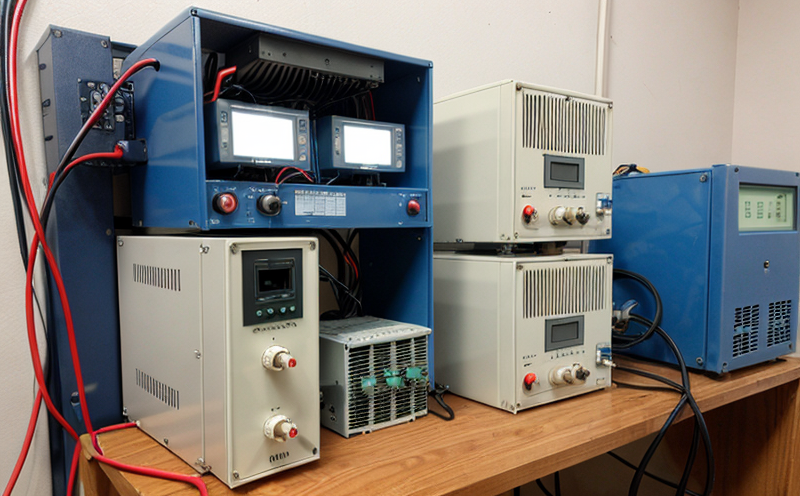ASTM D1169 Electrical Resistivity of Power Supply Liquids
The ASTM D1169 standard is a critical tool in the railway and transportation sector, ensuring that power supply liquids meet the necessary electrical resistivity requirements. This test evaluates how well these fluids conduct electricity, which directly impacts their safety and performance within high-voltage systems. The measurement of electrical resistivity helps prevent short circuits, ensure optimal energy transfer, and enhance overall system reliability.
Electrical resistivity is a key parameter for power supply liquids used in railway and transportation systems as they are often subjected to harsh environmental conditions, such as temperature fluctuations and mechanical stress. The test method described by ASTM D1169 allows manufacturers to ensure that their products maintain consistent performance over time and under varying operating conditions.
The test procedure outlined in ASTM D1169 involves measuring the electrical resistance of a sample between two electrodes placed at specific distances apart. This distance is standardized, ensuring consistent results across different laboratories. The resistivity value is then calculated based on this measurement using internationally recognized formulas. This standard ensures that all tests are conducted under controlled conditions, allowing for accurate comparison and validation.
The importance of ASTM D1169 cannot be overstated in the railway industry, where reliability and safety are paramount. By adhering to this standard, manufacturers can ensure their products meet the stringent requirements set by regulatory bodies and improve overall system performance. Moreover, compliance with ASTM D1169 is essential for quality assurance programs aimed at reducing maintenance costs and enhancing customer satisfaction.
Quality managers and compliance officers rely on ASTM D1169 to verify that power supply liquids are safe and effective in high-voltage railway systems. This standard also plays a crucial role in the research and development process, helping engineers refine their designs for improved performance and reliability. For procurement teams, it ensures they source products that meet industry standards.
To perform ASTM D1169 tests accurately, laboratories must have precise measuring equipment capable of withstanding industrial-grade conditions. The test requires a specific sample preparation method to ensure consistent results. The specimen is typically prepared by diluting the original liquid to achieve a known resistivity value for calibration purposes. Once ready, the sample can be placed between two electrodes and connected to an appropriate measurement device.
The results of ASTM D1169 tests are reported in ohm-centimeters (Ω·cm), which provides a clear indication of the fluid’s ability to conduct electricity. These values help determine whether the liquid meets specific performance criteria set by manufacturers, regulatory bodies, and customers. A lower resistivity indicates better conductivity, while higher values suggest poorer electrical properties.
In summary, ASTM D1169 is an essential tool in ensuring that power supply liquids used in railway systems are safe and effective. By adhering to this standard, manufacturers can improve their products’ reliability and performance, enhancing overall system safety and efficiency.
Applied Standards
The primary applied standard for ASTM D1169 Electrical Resistivity of Power Supply Liquids is the ASTM D1169-14(2018). This international standard provides detailed instructions on how to perform electrical resistivity measurements on insulating liquids used in high-voltage applications. The standard ensures consistency and accuracy across different laboratories, which is crucial for the railway sector where precision is vital.
ASTM D1169 specifies a series of procedures that involve preparing samples, positioning them between electrodes, and measuring the resistance using an appropriate instrument. The test method also includes guidelines on how to interpret results and compare them against specified limits. Compliance with ASTM D1169 helps ensure that power supply liquids used in railway systems meet stringent quality standards.
In addition to ASTM D1169, other relevant standards include ISO 7853:2014, which provides guidelines for the electrical resistivity of insulating oils. These international standards complement each other and provide comprehensive coverage of this critical parameter.
Eurolab Advantages
The Eurolab group brings extensive experience in railway and transportation testing to ASTM D1169 Electrical Resistivity of Power Supply Liquids services. Our team comprises experienced professionals who understand the unique challenges faced by this sector. With a focus on precision and accuracy, we ensure that every test conducted meets international standards.
Our laboratories are equipped with state-of-the-art equipment designed to withstand industrial-grade conditions. This ensures consistent results across different samples and tests, providing reliable data for your quality assurance programs. We pride ourselves on delivering accurate measurements that help you make informed decisions about product performance.
Beyond technical expertise, Eurolab offers comprehensive support throughout the testing process. Our customer service team is available to answer any questions you may have and provide guidance on sample preparation and interpretation of results. Additionally, we offer post-test analysis services to help you understand your data better.
At Eurolab, we take pride in our commitment to excellence. By choosing us for ASTM D1169 Electrical Resistivity of Power Supply Liquids testing, you can trust that your samples will be handled with care and precision. Our reputation for delivering high-quality results has earned us a strong following among quality managers, compliance officers, R&D engineers, and procurement professionals.
Use Cases and Application Examples
- Railway System Reliability: Ensuring that power supply liquids have the right electrical resistivity is crucial for maintaining reliable railway systems. Any deviation from acceptable levels could lead to short circuits or other failures, compromising safety.
- High-Voltage Testing: In high-voltage applications within transportation infrastructure, ASTM D1169 helps verify that insulating liquids perform optimally under extreme conditions.
- Regulatory Compliance: Adhering to ASTM D1169 ensures compliance with international regulations governing railway and transportation systems. This is essential for maintaining a safe operating environment.
- R&D Improvements: Engineers can use the results of ASTM D1169 tests as part of their research efforts, helping them develop more efficient power supply liquids tailored specifically to meet future needs.
The application examples above illustrate just some of the ways in which ASTM D1169 plays a vital role within the railway and transportation sector. By ensuring that all components function correctly and safely, this standard contributes significantly to the overall efficiency and reliability of these systems.





